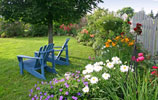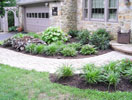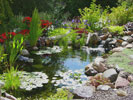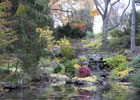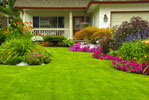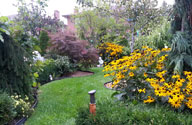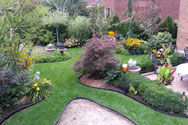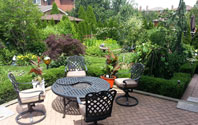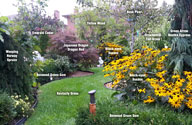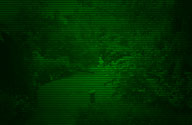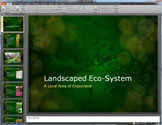Unit 3: Landscaping Design and Practice

This unit is focused on landscaping. Landscaping includes many things such as living organisms, plants, animals, earth, rock, natural materials, nature, a setting, a place of well being, a renewable system. Landscaping could include different materials, components, environments, maintenance, support, and design property and space.
Course Units and Descriptions
Use this table for an overview and navigate to each of the course unit pages.
| Unit | Description |
|---|---|
| Review course outline for more details | |
| 1 | Green Industries Intro & Safety- Intro, organization, and safety |
| 2 | Planting the Seed- design, sketching, building planter for herbs |
| 3 | Landscaping Design & Practice - design, planting, caring of landscape |
Unit Activity Quick Links, Click to Jump to the Specific Activity!
 Unit 3, Act. 1: Exploring an Ecosystem
Unit 3, Act. 1: Exploring an Ecosystem
Situation:
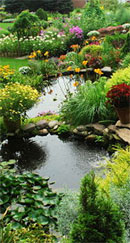
Every community has a natural community around them whether it be where you live, where you work, or where you play. By observing these community areas we will be able to see some patterns of support, cycles, and habit. When looking at landscaping, it can either support the natural process and habitat in those communities.
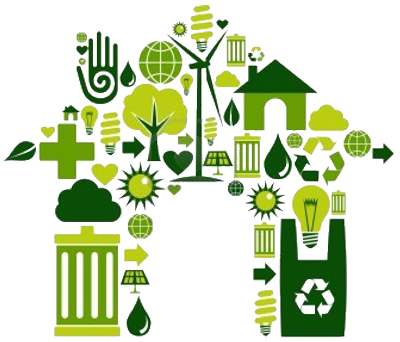
Problem/Challenge:
Review a common area either at home, a local park, or at school, identify location and report on the following key points in a picture/text-report covering trees, plants, animals, earth, and possibly stone/rock types. Select and Identify in detail, information on one component of each of the following:
- tree
- shrub
- flowering plant
- animal
Each of the four components is to detail the following information of each:
- official name
- major characteristics
- life span and growth cycle
- environment requirements
- food and nourishment
- maintenance and care
Once you have described in detail each of those components, you are to also make three improvements to support the current environment to better support this current environment such as an additional plant, tree, or animal support as an example that will improve this community ecosystem and help nurture it's system. For this section explain the following:
- general description
- how it can help your ecosystem
- best way to implement
Investigation/Ideas:

This section should give you some ideas and resources on what you can do for your ecosystem selection and report.
Sample Images
Bellow are some sample images showing different landscaped rich backgrounds that you may find locally. Can you guess which one of these is High Park, which is right in our neighborhood. Some of these images may give you some ideas on your improvements to your ecosystem landscaped design..
Support Resource links
- Islington Nurseries Ltd.
- Sheridan Nurseries
- Plant World
- Humber Nurseries Ltd.
- Dave's Garden
- US Dept of Agriculture (USDA)
- The Plant List
- Monrovia
- Plant Database
- Bachman's Landscaping
- New York Botanical Garden
- Weston Nurseries
- Cell Games
- Interactive plant tutorials
- Canadian Geographic magazine
- Totally Toronto
- Fauna of Toronto
- Landscape Primer

- Sustainable gardening
Sample Ecosystem Image and Report
Below shows three images of the same location with one used to identify our ecosystem components
The report sample below can be used to build your project report or you may start from scratch. You can download the Power Point file here.
Create/Construct:


The following steps will help you through your project report process::
- Decide on a location that you would like to work from, whether it be at a location around your home, park, or near the school.
- Take a picture showing the area you want to cover. It may be a challenge to find one with an animal actually in clear view, so you having an actual picture of animal is not required, but nice to have included. Note the course header area on the right showing a garden with a blue jay in mid flight in the garden. Another possibility could be a particular fish that is in the pond, but you can not see, or the raccoon you know usually is wandering in your area.
- Identify the different plants and trees in the picture you have provided using a graphic program such as illustrator using arrows and labels
- Select four specific items, a plant, a shrub, a tree, and an animal you would find in the picture. Animals would be the challenge here, so they do not have to be present, but would be considered a local habitant of the community.
- Research their details as mentioned in the Problem section and include a close-up picture for each.
- In the same picture, plan an improvement in four different areas that improve the ecosystem and enrich it even more.
- Show these improvements by including a picture and details about this item and how it will enrich/improve your ecosystem.
- Ensure your presentation has a title page, overview, summary, and resource page with a total of 15-20 pages total
Evaluation:
You will be evaluated based on your report presentation content, completeness, images, and communications.

| Evaluation Breakdown of Presentation Power Point | Marks |
|---|---|
| Always double check that you have completed all components for full marks. | |
| Ecosystem Picture- components identified | 10 |
| Structure- Title, overview, ecosystem, 4 details & improvements, summary & resources | 9 |
| 4 Details - Tree, shrub, flowering plant, and an animal with the 6 detailed points | 24 |
| 4 Improvements- description, why, and how to implement | 12 |
| Overall look - presentation look, background, text, images, | 5 |
| Presentation - Communication, images, information, understanding, & completeness | 20 |
| Mark total | 80 |
